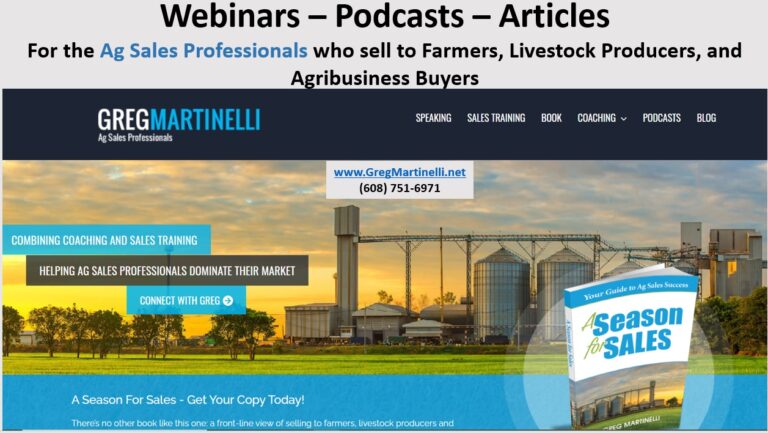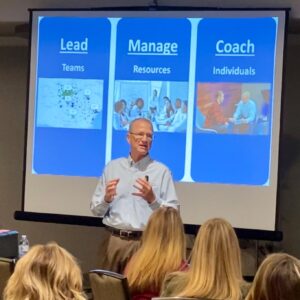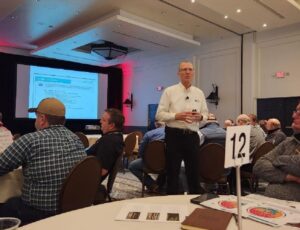While you are driving down County Road C today, ask yourself a real question. “What am I worth to my customer versus my competition?” I mean really ask yourself this question. And put it into actual dollars per unit of whatever you sell. “Am I worth $10/ton of feed over my closest competitor?” “$20/bag of seed?” “$1,000 on a tractor?”, “$7/gallon of chemical”, “10 cents/bushel”
If this feels like a strange question to ask yourself, just remember that your customer does this every time they realize you’re priced higher than your competition. In tough economic times, they do the math even more often than good times. If you are struggling to come up with a real answer and you are really brave, ask a couple of your top customers. Only ask if you have a very trusting relationship. I know it sounds crazy to actually bring up pricing with a customer that seems happy with you. However, even the strongest relationships are strained during this ag economy. So, asking is not like you are planting a new idea in their head. Asking this question will actually allow you to be part of the discussion that is already going on in your customer’s mind. I’d rather ask and discuss it while I’m there than have that conversation go on when my competitor is on the farm.
Initially, ask this question about you as a salesperson. Then you can ask these same questions about your company. You need to know in an apples to apples situation, what am I worth? Then you can start digging into what your company is worth compared to the competition.
Remember, this is as close to an apples to apples situation with your products. Nutrient for nutrient, ingredient to ingredient, you are equal to your competition. How much will your customer pay you versus your competition?
All across the agribusiness world, pricing discussions occur on a daily basis. As farmers reduce purchases or drop down to a cheaper alternative, agribusinesses are trying to figure out how to maintain and grow revenue. Product margins are under pressure as salespeople deal with decreasing farmer margins, which are below breakeven in many cases. Product advantages are one way to deal with margins. If your product and support services (delivery, location, financing, etc.) have a competitive advantage and have a better ROI to a farmer, then great. You can certainly hold your margins and grow your sales. However, if you don’t have that advantage (in the eyes of the farmer), then it comes back to what you are worth as their salesperson.
Areas to explore for answering this question:
- How much professional advice goes into selecting and using the products you sell? If it’s a custom dairy feed, then there is a lot of knowledge in creating that product. If it’s bagged corn, then probably not much advice
- How much service support do you offer your customer? Coordinating delivery, securing financing, adjusting orders to ensure the customer isn’t overloaded nor runs out of your products. A seed rep that makes sure the right varieties are available is providing a valuable service as certain genetics are hard to find at planting time.
- How well do you know and integrate into your customer’s business? Do you just stop by and shoot the breeze on a regular basis? Or, do you dig in, ask good questions, uncover needs, position products to those needs and strive to really improve your customer’s business?
- How easy is it to switch from you to another vendor? If it’s selling cash grain, all a farmer has to do to switch elevators is turn the steering wheel. If you are entrenched in helping their farming operation and work with different members of the family to grow their business, then it’s tougher to just switch overnight.
- How well are you connected to your customer’s customer? Everyone has a customer. I like to call it downstream from your customer. Are you knowledgeable and connected with that part of the industry? Ultimately, that’s who your customer is trying to sell their products to. The more you know about them and what they value, the more you can help your customer. Selling into the dairy industry, it’s important to know which components of milk are paying and how you can affect them. Selling to grain producers, it’s important to know what happens to local grain shipments throughout the year, discounts they are taking and any specialty programs going on to help advise your customer.
- How well are you connected or understand your customer’s boss? This might be their landlords, their investors, their lender or maybe their spouse. How do these individuals influence the decisions your customer makes? Are you bringing this information to your customer when advising them on your products?
- Time: Are you saving your customer time? Often, when working with a sales agronomist, they will tell me how busy their customer is and has no time to know all the details around the chemicals, seed selection and fertilizer recommendations provided. That entire burden falls on the agronomist’s shoulders. This is a tremendous value, which should not be free. You shouldn’t have to be dollar for dollar compared to your competition.
My final comments on this area are about the friendship value. Salespeople might say, “I know this customer really well. We go to the same church. Our kids are in school together. Heck, we even went to school together.” I understand that establishing a good relationship with a customer is important and I’ve had my share of them as well. However, if you are relying too much on the relationship as your competitive advantage, rethink that strategy. First, it’s going to allow your competition to come in and provide value to your customer’s business. To your customer, this might even look like you were taking advantage of your friendship and not doing your job as a salesperson. Secondly, it’s going to hurt when your long-time customer and friend switches to your competition.
My final-final question is this, “Once you feel like you know what you are worth compared to your competition, do you charge for it?” Do you actually capture that extra value? Or do you give it away?
My absolute final question for you, “Do you have a tactful way of reminding your customer of the value that you bring?”
If you found this to be helpful, forward on to someone you know who might also appreciate it.
For more Ag Sales Training, Ag Sales Coaching and Leading Ag Sales Teams, go to http://www.GregMartinelli.net/




